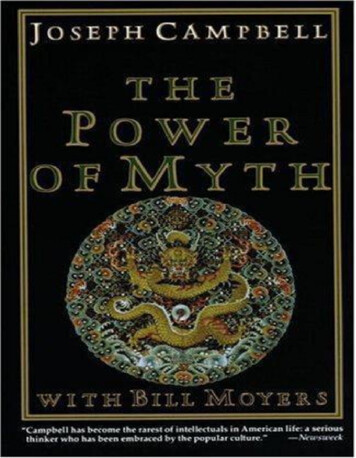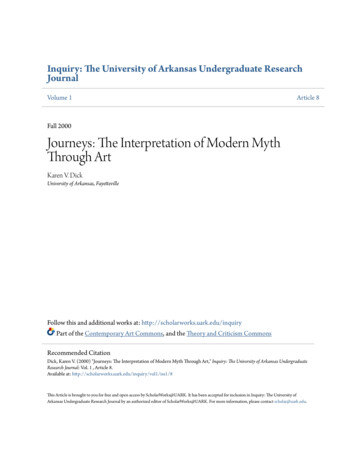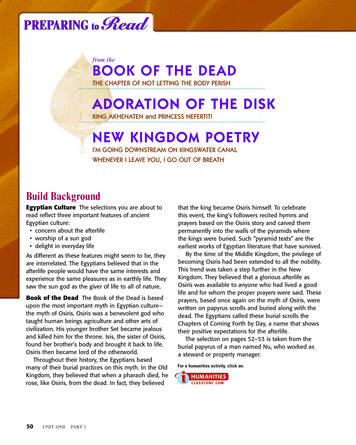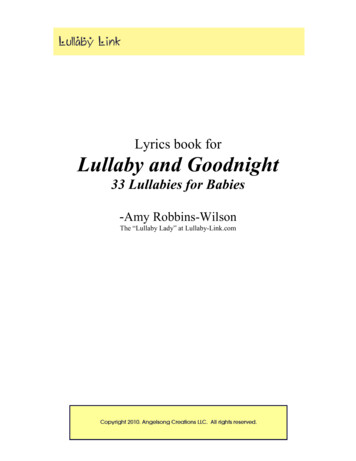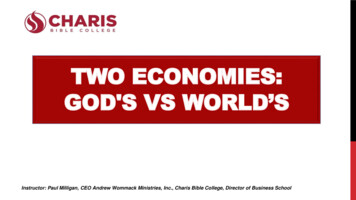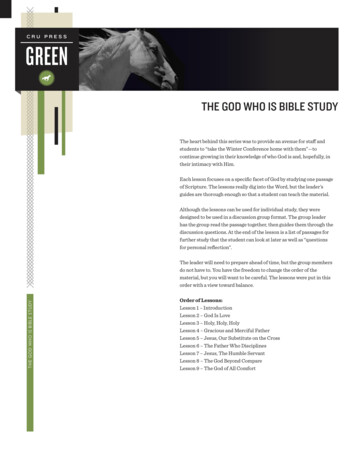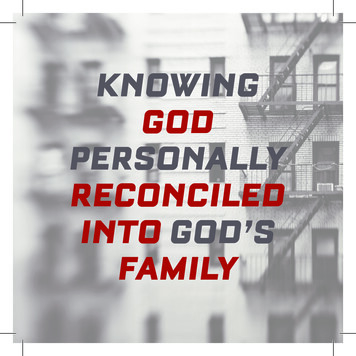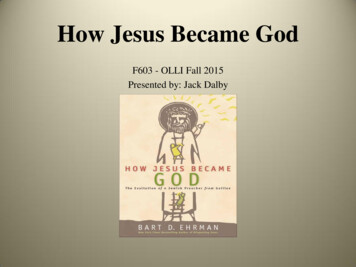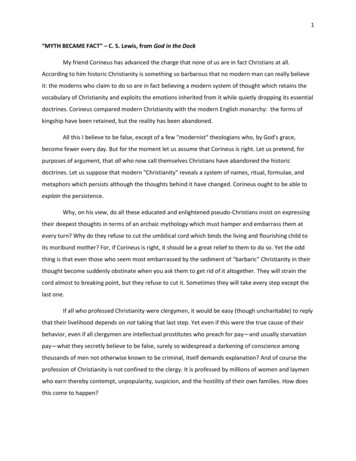
Transcription
1“MYTH BECAME FACT” – C. S. Lewis, from God in the DockMy friend Corineus has advanced the charge that none of us are in fact Christians at all.According to him historic Christianity is something so barbarous that no modern man can really believeit: the moderns who claim to do so are in fact believing a modern system of thought which retains thevocabulary of Christianity and exploits the emotions inherited from it while quietly dropping its essentialdoctrines. Corineus compared modern Christianity with the modern English monarchy: the forms ofkingship have been retained, but the reality has been abandoned.All this I believe to be false, except of a few "modernist" theologians who, by God's grace,become fewer every day. But for the moment let us assume that Corineus is right. Let us pretend, forpurposes of argument, that all who now call themselves Christians have abandoned the historicdoctrines. Let us suppose that modern "Christianity" reveals a system of names, ritual, formulae, andmetaphors which persists although the thoughts behind it have changed. Corineus ought to be able toexplain the persistence.Why, on his view, do all these educated and enlightened pseudo-Christians insist on expressingtheir deepest thoughts in terms of an archaic mythology which must hamper and embarrass them atevery turn? Why do they refuse to cut the umbilical cord which binds the living and flourishing child toits moribund mother? For, if Corineus is right, it should be a great relief to them to do so. Yet the oddthing is that even those who seem most embarrassed by the sediment of "barbaric" Christianity in theirthought become suddenly obstinate when you ask them to get rid of it altogether. They will strain thecord almost to breaking point, but they refuse to cut it. Sometimes they will take every step except thelast one.If all who professed Christianity were clergymen, it would be easy (though uncharitable) to replythat their livelihood depends on not taking that last step. Yet even if this were the true cause of theirbehavior, even if all clergymen are intellectual prostitutes who preach for pay—and usually starvationpay—what they secretly believe to be false, surely so widespread a darkening of conscience amongthousands of men not otherwise known to be criminal, itself demands explanation? And of course theprofession of Christianity is not confined to the clergy. It is professed by millions of women and laymenwho earn thereby contempt, unpopularity, suspicion, and the hostility of their own families. How doesthis come to happen?
2Obstinacies of this sort are interesting. "Why not cut the cord?" asks Corineus. "Everythingwould be much easier if you would free your thought from this vestigial mythology." To be sure: fareasier. Life would be far easier for the mother of an invalid child if she put it into an institution andadopted someone else's healthy baby instead. Life would be far easier to many a man if he abandonedthe woman he has actually fallen in love with and married someone else because she is more suitable.The only defect of the healthy baby and the suitable woman is that they leave out the patient's onlyreason for bothering about a child or wife at all. "Would not conversation be much more rational thandancing?" said Jane Austen's Miss Bingley. "Much more rational," replied Mr. Bingley, "but much lesslike a ball."1 In the same way, it would be much more rational to abolish the English monarchy. But howif, by doing so, you leave out the one element in our state which matters most? How if the monarchy isthe channel through which all the vital elements of citizenship—loyalty, the consecration of secular life,the hierarchical principle, splendor, ceremony, continuity—still trickle down to irrigate the dust bowl ofmodern economic Statecraft?The real answer of even the most "modernist" Christianity to Corineus is the same. Evenassuming (which I most constantly deny) that the doctrines of historic Christianity are merely mythical, itis the myth which is the vital and nourishing element in the whole concern. Corineus wants us to movewith the times. Now, we know where times move. They move away. But in religion we find somethingthat does not move away. It is what Corineus calls the myth, that abides; it is what he calls the modernand living thought that moves away. Not only the thought of theologians, but the thought of antitheologians. Where are the predecessors of Corineus? Where is the Epicureanism of Lucretius2, thepagan revival of Julian the Apostate3? Where are the Gnostics, where is the monism of Averroes4, thedeism of Voltaire, the dogmatic materialism of the great Victorians? They have moved with the times.But the thing they were all attacking remains: Corineus finds it still there to attack. The myth (to speakhis language) has outlived the thoughts of all its defenders and of all its adversaries. It is the myth thatgives life. Those elements even in modernist Christianity which Corineus regards as vestigial, are thesubstance: what he takes for the "real modern belief" is the shadow.1Pride and Prejudice, ch. xi.Titus Lucretius Carus (c. 99-55 B.C.), the Roman poet.3Roman emperor, A.D. 361-3.4Averroës (1126-98), of Cordova, believed that only one intellect exists for the whole human race in which everyindividual participates, to the exclusion of personal immortality.2
3To explain this we must look a little closer at myth in general, and at this myth in particular.Human intellect is incurably abstract. Pure mathematics is the type of successful thought. Yet the onlyrealities we experience are concrete—this pain, this pleasure, this dog, this man. While we are lovingthe man, bearing the pain, enjoying the pleasure, we are not intellectually apprehending Pleasure, Painor Personality. When we begin to do so, on the other hand, the concrete realities sink to the level ofmere instances or examples: we are no longer dealing with them, but with that which they exemplify.This is our dilemma—either to taste and not to know or to know and not to taste—or, more strictly, tolack one kind of knowledge because we are in an experience or to lack another kind because we areoutside it. As thinkers we are cut off from what we think about; as tasting, touching, willing, loving,hating, we do not clearly understand. The more lucidly we think, the more we are cut off: the moredeeply we enter into reality, the less we can think. You cannot study pleasure in the moment of thenuptial embrace, nor repentance while repenting, nor analyze the nature of humor while roaring withlaughter. But when else can you really know these things? "If only my toothache would stop, I couldwrite another chapter about pain." But once it stops, what do I know about pain?Of this tragic dilemma myth is the partial solution. In the enjoyment of a great myth we comenearest to experiencing as a concrete what can otherwise be understood only as an abstraction. At thismoment, for example, I am trying to understand something very abstract indeed—the fading, vanishingof tasted reality as we try to grasp it with the discursive reason. Probably I have made heavy weather ofit. But if I remind you, instead, of Orpheus and Eurydice5, how he was suffered to lead her by the handbut, when he turned round to look at her, she disappeared, what was merely a principle becomesimaginable. You may reply that you never till this moment attached that "meaning" to that myth. Ofcourse not. You are not looking for an abstract "meaning" at all. If that was what you were doing, themyth would be for you no true myth but a mere allegory. You were not knowing, but tasting; but whatyou were tasting turns out to be a universal principle. The moment we state this principle, we areadmittedly back in the world of abstraction. It is only while receiving the myth as a story that youexperience the principle concretely.When we translate we get abstraction-or rather, dozens of abstractions. What flows into youfrom the myth is not truth but reality (truth is always about something, but reality is that about whichtruth is), and, therefore, every myth becomes the father of innumerable truths on the abstract level.5The ancient legend of Orpheus and Eurydice concerns the fateful love of Orpheus of Thrace, son of Apollo and themuse Calliope, for the beautiful Eurydice (from Eurudike, "she whose justice extends widely").
4Myth is the mountain whence all the different streams arise which become truths down here in thevalley; in hac valle abstractionis6. Or, if you prefer, myth is the isthmus which connects the peninsularworld of thought with that vast continent we really belong to. It is not, like truth, abstract; nor is it, likedirect experience, bound to the particular.Now as myth transcends thought, incarnation transcends myth. The heart of Christianity is amyth which is also a fact. The old myth of the Dying God, without ceasing to be myth, comes down fromthe heaven of legend and imagination to the earth of history. It happens—at a particular date, in aparticular place, followed by definable historical consequences. We pass from a Balder7 or an Osiris8,dying nobody knows when or where, to a historical person crucified (it is all in order) under PontiusPilate. By becoming fact it does not cease to be myth: that is the miracle. I suspect that men havesometimes derived more spiritual sustenance from myths they did not believe than from the religionthey professed. To be truly Christian we must both assent to the historical fact and also receive the myth(fact though it has become) with the same imaginative embrace which we accord to all myths. The oneis hardly more necessary than the other.A man who disbelieved the Christian story as fact but continually fed on it as myth would,perhaps, be more spiritually alive than one who assented and did not think much about it. Themodernist—the extreme modernist, infidel in all but name—need not be called a fool or hypocritebecause he obstinately retains, even in the midst of his intellectual atheism, the language, rites,sacraments, and story of the Christians. The poor man may be clinging (with a wisdom he himself by nomeans understands) to that which is his life. It would have been better that Loisy9 should have remaineda Christian: it would not necessarily have been better that he should have purged his thought of vestigialChristianity.Those who do not know that this great myth became fact when the Virgin conceived are,indeed, to be pitied. But Christians also need to be reminded—we may thank Corineus for remindingus—that what became fact was a myth, that it carries with it into the world of fact all the properties of amyth. God is more than a god, not less; Christ is more than Balder, not less. We must not be ashamed of6“in this valley of separation.”A god in Norse mythology who was so handsome, generous, and good that he gave off light simply by the purityof his character, and who dies but is to be reborn in a new world.8In Egyptian mythology, the first-born son of the gods who created the world who is killed by his brother but isbrought back to life by sister-wife Isis.9Alfred Loisy (1857-1940), a French theologian and founder of the Modernist Movement.7
5the mythical radiance resting on our theology. We must not be nervous about "parallels" and "paganChrists": they ought to be there—it would be a stumbling block if they weren't. We must not, in falsespirituality, withhold our imaginative welcome. If God chooses to be mythopoeic10—and is not the skyitself a myth—shall we refuse to be mythopathic11? For this is the marriage of heaven and earth: perfectmyth and perfect fact: claiming not only our love and our obedience, but also our wonder and delight,addressed to the savage, the child, and the poet in each one of us no less than to the moralist, thescholar, and the philosopher.Citation:Lewis, C. S. (1972). Myth became fact. In Walter Hooper (Ed.), God in the Dock: Essays onTheology and Ethics, Grand Rapids, MI: William B. Eerdmans Publishing, pp. 63-67. Thisessay first appeared in World Dominion, vol. XXII (September-October, 1944), pp. 267-270.10“Mythopoeic” means “of or relating to the making of myths.” Tolkien wrote a poem entitled Mythopoeia, or“The Making of Myths,” about the conversation he and Dyson had with Lewis on September 19, 1931 about thefact that Christianity was a true myth.11“Mythopathic” means something like “being sensitive to myths.” Although the Latin and Greek word “pathos” issometimes translated “suffering,” Lewis is using the suffix here with a connotation similar to that of the Englishword “pathos” meaning “a feeling such as sympathy, tenderness, or sorrow.” So “mythopathic” denotes theinclination of one to be receptive to myth or to be moved by myth, and, more generally, being disposed to receivenourishment and understanding from stories.
1 “MYTH E AME FA T” – C. S. Lewis, from God in the Dock My friend Corineus has advanced the charge that none of us are in fact Christians at all. According to him historic Christianity is som
